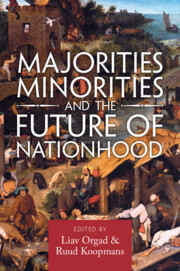Book contents
- Majorities, Minorities, and the Future of Nationhood
- Majorities, Minorities, and the Future of Nationhood
- Copyright page
- Contents
- Figures
- Tables
- Contributors
- Preface
- Acknowledgments
- A Note on the Cover
- 1 Majority–Minority Constellations
- 2 Are There Any Cultural Majority Rights?
- 3 Identity Not Culture
- 4 Nationhood, Multiculturalism, and the Ethics of Membership
- 5 Reconciling the Cultural Claims of Majorities and Minorities
- 6 Linking Minority Rights and Majority Attitudes
- 7 The Liberalism of Fear
- 8 Multiculturalism without Privileging Liberalism
- 9 Why Every Nation Should Nurture (a Thick and Inclusive) Nationalism
- 10 Populism and Cultural Majority Rights
- 11 Legitimate Populism and Liberal Overreach
- 12 The Causes of Populism and the Problem of Cultural Majority Rights
- Index
- References
12 - The Causes of Populism and the Problem of Cultural Majority Rights
Published online by Cambridge University Press: 12 November 2022
- Majorities, Minorities, and the Future of Nationhood
- Majorities, Minorities, and the Future of Nationhood
- Copyright page
- Contents
- Figures
- Tables
- Contributors
- Preface
- Acknowledgments
- A Note on the Cover
- 1 Majority–Minority Constellations
- 2 Are There Any Cultural Majority Rights?
- 3 Identity Not Culture
- 4 Nationhood, Multiculturalism, and the Ethics of Membership
- 5 Reconciling the Cultural Claims of Majorities and Minorities
- 6 Linking Minority Rights and Majority Attitudes
- 7 The Liberalism of Fear
- 8 Multiculturalism without Privileging Liberalism
- 9 Why Every Nation Should Nurture (a Thick and Inclusive) Nationalism
- 10 Populism and Cultural Majority Rights
- 11 Legitimate Populism and Liberal Overreach
- 12 The Causes of Populism and the Problem of Cultural Majority Rights
- Index
- References
Summary
This chapter analyzes historical and cross-national evidence to contend that the angry politics of populism does not simply reflect the autonomous preferences of voters shocked by the pressures of globalization. Rather, voters express right-wing identity issues only after politicians – especially mainstream center-right politicians – have accentuated appeals to cultural self-defense in their own electoral campaigns. In brief, the identity appeals of populism emerge as a product of mainstream political parties’ efforts to cope with the contradictions of capitalism and democracy in an age of high socioeconomic inequality. In this sense, the very notion of a cultural majority is itself politically constructed – an imagined community of ephemeral democratic normative weight, crafted by center-right political parties as they scramble to try win electoral majorities in an age of heightened socioeconomic inequality. While Madisonian political majorities have normative weight, cultural majorities do not. If correct, this argument suggests that a focus on addressing the economic roots of populism is pivotal as is developing a civic notion of citizenship, no matter the ethnicity or background of citizens.
Keywords
- Type
- Chapter
- Information
- Majorities, Minorities, and the Future of Nationhood , pp. 294 - 306Publisher: Cambridge University PressPrint publication year: 2022

